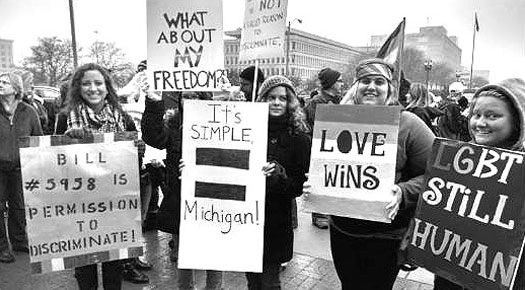
Demonstrators met outside Michigan capitol on December 16, chanting slogans and carrying placards in opposition to a religious freedom bill that has been labeled as the state’s latest license to discriminate.
28-year-old Nikki Gestwite led the protest on Facebook after two of her friends initially conceived plans of organizing a small rally against the proposed bill in their hometown of Adrian.
“We will not stand for hate,” said Gestwite, who described the event as a legitimate grassroots affair. “We don’t agree with the bill. We don’t think it's right, and we think it's kind of a step back to the '60s. That's not cool.”
Speakers were lined up to address the demonstrators near the west steps of the capitol and Gestwite said she wanted to invite musicians to the event as well, as they could possibly help the demonstrators feel hopeful.
“I want to be lifted and given hope,” she said. “We are upset, but it’s also very much about hope.”
The Religious Freedom Restoration Act (RFRA), which was approved by the state’s Republican-led House in the first week of December, is based on a federal draft that was enacted in 1993. If passed, it would permit individuals or businesses to receive exemptions from local as well as state laws that otherwise substantially burden their sincerely held religious beliefs. In such a situation, a government could fight such claims by showing it has compelling interest for the law and seeks to achieve a public policy goal in the least restraining way possible. The final call would of course be made by the court concerned.
Those who support the bill, say it echoes the same religious freedom laws that are mentioned in books not only at the federal level but also in 19 other states. They continue to fight against the argument that the bill would lead to widespread exemptions or sanction discrimination.
“The kinds of cases that religious claimants have made under RFRA for the most part do not involve the culture wars at all,” University of Virginia law professor Douglas Laycock said Monday morning during a press call organized by the Michigan Catholic Conference. “These are cases about people paying fines or going to jail for their religion, even when the state doesn’t really have a good reason, in America in the 21st Century. That should not be happening. If the state does have a good reason, the state wins.”
However, critics are of the opinion that this bill, which was tabled alongside a gay rights proposal, could be misused to dispute local non-discrimination ordinances as well as several other municipal and state laws.
“I happen to be a lesbian, so it’s very important to me in that way, but it’s really about anybody who is different,” said Gestwite, who works with a volunteer community group called Changing Adrian.
Photo Credits: Adrian Today
